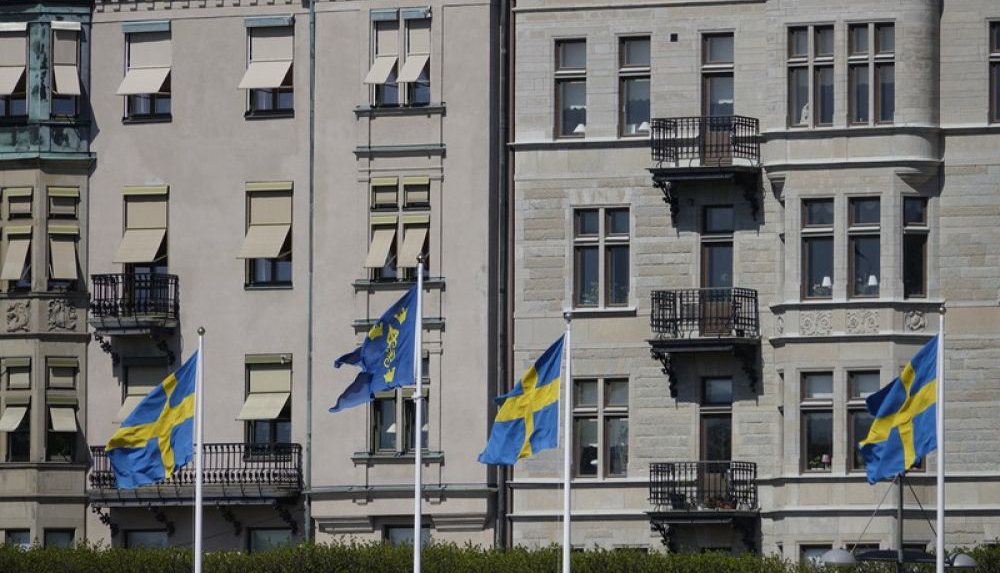STOCKHOLM: Sweden's central bank announced Tuesday a big interest rate increase to combat decades-high inflation ahead of more hikes expected by its peers in the United States and Britain later this week. The one-percentage-point increase, the biggest rise since the bank set an inflation target in 1993, surprised analysts who had expected a 0.75-percentage-point hike. It more than doubles the policy rate to 1.75 percent. Central banks worldwide have been raising borrowing costs in efforts to tame runaway prices, at the risk of causing recession as the moves slow economic activity.
"Inflation is too high," Sweden's Riksbank said in a statement, adding that it was undermining the purchasing power of households and making it more difficult for them and businesses to plan their finances. The bank forecast that it will continue to raise rates in the coming six months. "Inflation has risen rapidly and is high both in Sweden and abroad," the statement said.
Swedish inflation accelerated to 9.0 percent in August, the highest level since 1991. The central bank now expects the economy to shrink by 0.7 percent next year after previously forecasting growth. It raised its growth forecast for this year, however, to 2.7 percent.
The US Federal Reserve is expected to unleash a third straight 0.75-percentage-point rate hike on Wednesday, while the Bank of England is also due to raise borrowing costs the following day. Stocks retreated Tuesday as Sweden's jumbo interest rate hike, aimed at tackling inflation, stoked expectations of more increases this week from the US Federal Reserve and the Bank of England.
The Swedish central bank sprang the biggest rise in three decades, ramping up its rate by a full percentage point to 1.75 percent. The news sent the region's markets into reverse as tighter global borrowing costs bear down on economic activity.
Frankfurt equities dropped about 0.8 percent as news of rocketing German producer prices further fanned inflation fears. London fell after reopening following the funeral of Queen Elizabeth II on Monday. The euro dipped against main rivals after Monday's surge, while oil prices slid on the stronger dollar.
US stocks fell early Tuesday with the Federal Reserve poised to begin its two-day meeting that is expected to result in another big interest rate hike. The Fed will announce its latest rate decision on Wednesday, with investors fearing that after two straight hikes of 0.75 percentage point, the central bank could even go for a third or perhaps even a full point this time. With the announcement widely anticipated, analysts have set their sights on the prospect of future increases.
Nerves jangling again
"European stocks rallied at the open-but a jumbo rate hike from Sweden's central bank sent the nerves jangling again as investors worry about what's in store from global central banks," Markets.com analyst Neil Wilson told AFP. The Fed's decision is the main markets focus after figures last week showed consumer prices are still rising at a pace not seen since the early 1980s. The US Federal Reserve is forecast Wednesday to hike its key interest rate by another 0.75 percentage points.
Some observers have even speculated over a possible one-percentage-point move. One day later, the Bank of England (BoE) is predicted to deliver another sizeable increase in British borrowing costs. "The (Swedish) hike underlined just how serious central banks are taking the inflation threat and with 75 basis point hikes from the Bank of England and Federal Reserve looking like slam-dunk certainties, the early optimism in the markets quickly evaporated," added Wilson. "The reality of central bank tightening... is keeping a lid on stocks and will continue to act as a headwind for risk."
Sentiment on Wall Street was also dampened by data showing drop in housing construction permits, although housing starts increased 12.2 percent month-on-month in August. "The key takeaway from the report is that the weakness in the permits data suggests the strength in starts is not sustainable, especially when also taking into account that mortgage rates have risen since the July-August period," said analyst Patrick O'Hare at Briefing.com. Asian markets meanwhile enjoyed a much-needed bounce Tuesday, tracking Wall Street's late rally as investors gird themselves for another big Fed hike, though fears of a recession remain elevated. - AFP











